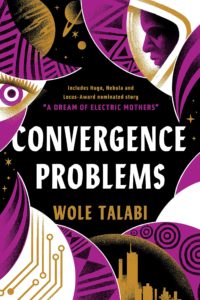
This review is based on an eARC (Advance Reading Copy) provided by the publisher via NetGalley in exchange for an honest review. Convergence Problems will be released on February 13, 2024.
I’ve been following Wole Talabi’s recommendations for African short sci-fi and fantasy for several years now, and after loving “The Regression Test” and “A Dream of Electric Mothers,” I’ve found myself regularly seeking out the work of Talabi himself. So I was excited for the opportunity to read and review his newest short fiction collection: Convergence Problems.
Convergence Problems features sixteen works of short fiction—four I’d read previously and twelve new-to-me—with the Hugo and Nebula finalist “A Dream of Electric Mothers” headlining the thirteen reprints and three new stories offering readers something they can’t get anywhere else. The vast majority of the collection is sci-fi, though the nightmare god title character in his novel Shigidi and the Brass Head of Olabufon makes a notable appearance in the fantasy novelette “Saturday’s Song.”
The capstone “A Dream of Electric Mothers,” a compelling story both of personal grief and of a nation relying too heavily on the words of their ancestors, is undoubtedly the jewel of the collection. I’m always a little disappointed when none of the new-to-me stories hit the level of one I’ve already read, but when that one is a story I’d nominated for a Hugo, it’s not much surprise to see it remain my favorite. But though nothing else quite hit that level, I was impressed by just how consistently enjoyable Convergence Problems was.
Typically, in a collection of sixteen stories, I’d expect to find at least two or three that I didn’t much care for. Given that a good quarter of the collection consisted of flash fiction, which I tend not to enjoy, I certainly would’ve expected a few misses in this one. And yet only “Tends to Zero”—not a bad story, but a bleak tragedy with a lead that didn’t move me—didn’t really click for me. The rest ranged from good to excellent.
Admittedly, the flash pieces probably won’t stick in my mind for long, but they were all good reads in the moment, with small-scale adventure, romances and betrayals serving up quality, bite-sized tales. Perhaps most notable here is the newest of the bunch, “Nigerian Dreams,” which leavens its brief—but gripping!—plot with musings on a fragmented and unnatural land never able to overcome the odds to forge a unified identity.
Continuing the theme, the other two new-in-2024 entries were my favorites among the longer new-to-me stories. “Ganger,” the issue’s sole novella, beautifully blends folklore and dystopia, with two different stories—one of magic and one of technology—interwoven to bring out a deep thematic resonance that makes them both the richer. The dystopian main storyline follows a girl chafing against her life as nothing but entertainment for the wealthy, with neither privacy nor freedom from the all-encompassing AI that ensures her physical needs are met while caring nothing for her sense of fulfillment. Life outside the city is a quick death sentence, but there may be one who can offer respite from the constant surveillance inside, for a price. It’s a story that’s bound to capture the attention of fans of dystopian fiction, though the main plot isn’t one that breaks much new ground. Rather, it’s the snippets of folklore showing how an entirely different context can yield such a similar story that really makes the novella pop.
The novelette “Ember” also features a lead chafing against a world he can’t change, with the once-favored son of a small village struggling to cope with the death of the fossil fuel industry, and with it the value of his education and ambition. Unwilling to admit failure, he pours more and more into trying to revive an old refinery in hopes of bringing something to his people. It’s not a happy story, but it is a compelling one, with a refreshingly genuine portrayal of a tragic figure.
I’d read “Saturday’s Song” when it appeared in Lightspeed, but it’s another novelette that’s well worth the read, with a solid folkloric plot and an excellent frame narrative that’s truly a love letter to storytelling. And as someone who enjoys found document fiction, I also enjoyed “Abeokuta 52,” a story framed as a message board thread. There’s also a story about a space rescue interspersed with fraught family relationships, and another about the technology that increases productivity at the cost of personality. They’re not always happy stories, but they’re almost universally engaging and thought-provoking.
Readers who have been engaged in short sci-fi over the last couple years won’t be surprised to find that “A Dream of Electric Mothers” is the star of the show, but Convergence Problems is a strong collection that’s engaging from start to finish and really shows off the depth of Talabi’s catalog.
Recommended if you like: sci-fi centered on ideas and relationships, blending of sci-fi and folklore, Africanfuturism.
Can I use it for Bingo? It’s hard mode for POC Author and Five Short Stories, and “Ganger” is hard mode for Novella.
Overall rating: 15 of Tar Vol’s 20. Four stars on Goodreads.
